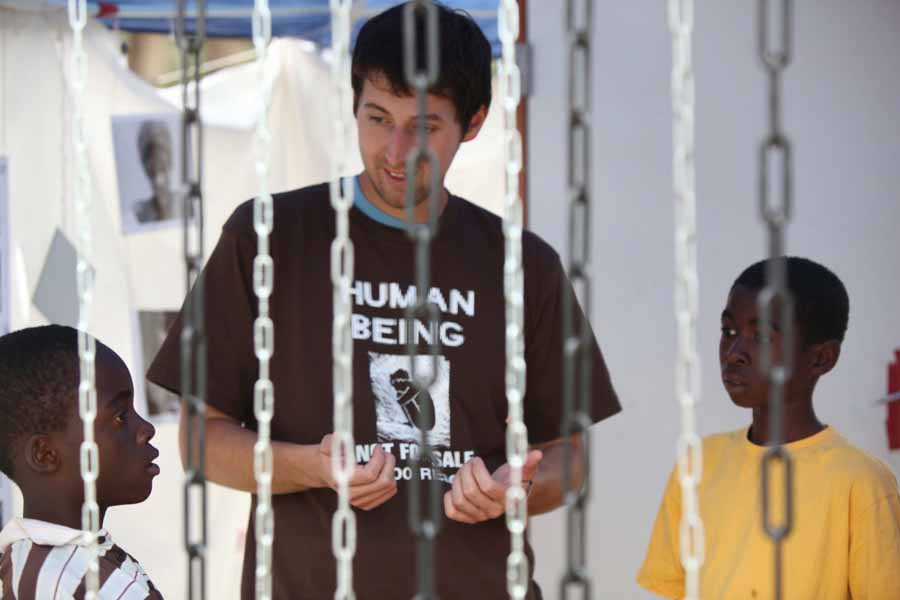
PRETORIA, South Africa (BP)–Finally the beatings stop. In the corner of the dirty, unfurnished apartment, Joy tends to her wounds before the men come back to rape her.
Her journey here seems unreal, since one of the men had told her he loved her and that she was special. Now the man tells her that he is her pimp. Locked in a small, dank room, undressed and assaulted, she has forgotten how many days have passed since she has been trafficked, but she remembers how many times she has been sexually and physically abused.
Joy is a victim of the human trafficking trade, which buys and sells 2 to 4 million people every year. Fortunately, Joy was eventually found and returned to her family. Many other women’s stories do not have such a hopeful ending.
According to the Tshwane Leadership Foundation, a Christian mission organization based in Pretoria, human trafficking is a modern-day form of slavery.
“Ninety-five percent of [trafficking victims] are totally disempowered and will be abused in one way or another sexually,” Berend Brock, a TLF volunteer from Germany, said. “And the worst part of that will be [they are] completely exploited in prostitution, over and over again, on a daily basis.”
During the World Cup competition in South Africa, TLF sponsored a “Better World Village” event in Burgers Park in Pretoria. Burgers Park is an area of fenced-in greenery, with old buildings rising around it on all sides providing a pleasant environment for children to play and adults to relax.
The event showed World Cup matches on a big screen and had interactive booths on social issues such as human trafficking that are prevalent in South Africa and the world.
“It’s a place to imagine a better world in many ways,” Brock, who worked at the human trafficking booth, said. “… For instance, imagine a better world where people are not for sale. We’re trying to sensitize people about the dangers of human trafficking. We don’t want people to be tricked [into being trafficked].”
Many times a trafficker or pimp will lure his or her victims with promises of fame, money, scholarships or modeling contracts, so Brock is working with TLF to educate children about the dangers of human trafficking and how to keep from becoming victims.
A group of three young boys cautiously approach the human trafficking tent, curious about the white footsteps leading inside that read “Love,” “Job,” “Better Future” and “Money.”
A volunteer goes to meet them and begins asking them about human trafficking. As he talks, their inquisitive eyes lower to his shirt and widen when they read the penetrating message, “Human Being — Not For Sale.” When he points to the footprints leading to a black door, he tells them it is through offers like money, scholarships or fame that many are tricked and then taken away.
Once the boys walk through the imposing black door, they enter a room with photos of trafficked children, with chains swaying in the wind. The footprints have turned black, and papers with trafficking statistics in South Africa are scattered on the floor. One sticks out from the rest, bearing an appalling message: “28,000-38,000 Children are Forced into the Sex Industry of South Africa every year.”
Once the boys exit the tent, they paint their hands with pink or black paint and place a handprint on a large sign reading “Not For Sale,” symbolizing each child who has put up a hand to “STOP” the sale of men, women and children. The boys then play soccer with a ball reading “Kick Out Human Trafficking.”
Human trafficking is the fastest-growing international crime and second in size only to the drug trafficking industry, according to the U.N. Office on Crime and Drugs.
“To get involved in [trying to stop trafficking] means to actually hear the bad stories,” Brock replies when asked why human trafficking continues in today’s world. “Even our politicians and police officers are generally not willing to hear [the stories]. That’s a shame, a crying shame.”
He adds, “This is the worst that can happen to a person, and it’s the least we want to get involved in. And that simply has to change.”
–30–
Evelyn Adamson is an intern writer for the International Mission Board’s global communication team who were on assignment in South Africa to cover the events, matches and ministries related to the World Cup.
















